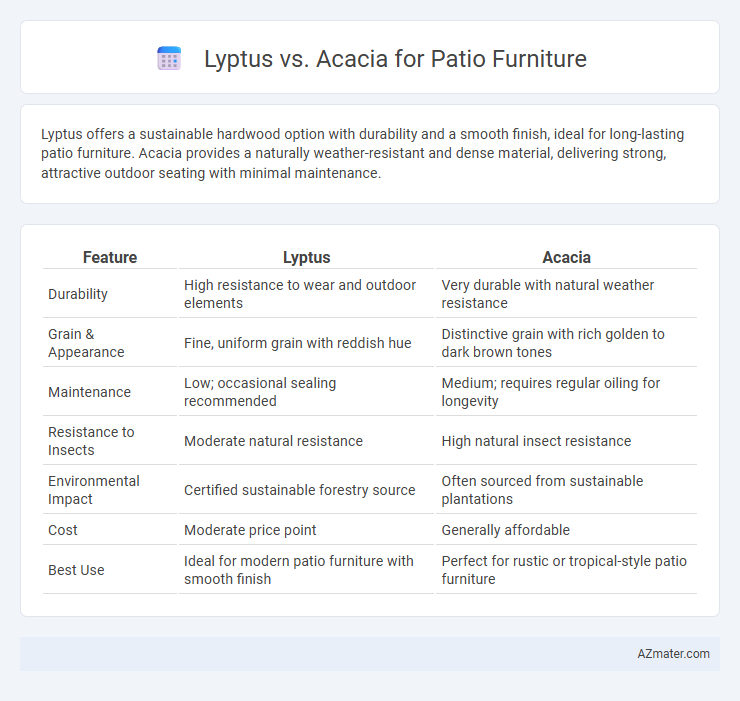Lyptus offers a sustainable hardwood option with durability and a smooth finish, ideal for long-lasting patio furniture. Acacia provides a naturally weather-resistant and dense material, delivering strong, attractive outdoor seating with minimal maintenance.
Table of Comparison
| Feature | Lyptus | Acacia |
|---|---|---|
| Durability | High resistance to wear and outdoor elements | Very durable with natural weather resistance |
| Grain & Appearance | Fine, uniform grain with reddish hue | Distinctive grain with rich golden to dark brown tones |
| Maintenance | Low; occasional sealing recommended | Medium; requires regular oiling for longevity |
| Resistance to Insects | Moderate natural resistance | High natural insect resistance |
| Environmental Impact | Certified sustainable forestry source | Often sourced from sustainable plantations |
| Cost | Moderate price point | Generally affordable |
| Best Use | Ideal for modern patio furniture with smooth finish | Perfect for rustic or tropical-style patio furniture |
Introduction to Lyptus and Acacia Wood
Lyptus is a sustainable hardwood hybrid derived from Eucalyptus species, known for its tight grain, durability, and resistance to moisture, making it a popular choice for patio furniture. Acacia wood, harvested from fast-growing tropical trees, offers a rich, varied grain pattern with high natural oil content that enhances its weather resistance and longevity outdoors. Both Lyptus and Acacia provide eco-friendly options with excellent strength and aesthetic appeal, suitable for durable, stylish patio furniture.
Origins and Sustainability of Lyptus vs Acacia
Lyptus wood is a hybrid Eucalyptus species cultivated primarily in managed plantations in Brazil, offering rapid growth and minimal environmental impact through sustainable forestry practices. In contrast, Acacia comprises a diverse genus with species sourced from various regions, often leading to varied sustainability credentials depending on harvesting methods and certifications like FSC. Lyptus tends to be more sustainable due to its controlled plantation origin and efficient growth cycle, while Acacia's sustainability heavily relies on the specific sourcing and environmental management of its native forests.
Durability and Weather Resistance Comparison
Lyptus offers impressive durability with its hardwood density and resistance to dents and scratches, making it suitable for high-traffic patio furniture. Acacia wood excels in weather resistance due to its natural oils that repel moisture, preventing rot and insect damage even in humid or rainy environments. Both woods provide robust options, but Acacia's superior water-resistant properties often make it a preferred choice for outdoor furniture exposed to varying weather conditions.
Appearance and Aesthetic Appeal
Lyptus wood offers a smooth, uniform grain with a warm reddish-brown hue that enhances patio furniture with a contemporary, polished look. Acacia features a rich, darker tone with distinctive grain patterns and natural variations, providing a rustic, organic aesthetic ideal for outdoor settings. Both woods boast durability for outdoor use, but Lyptus's consistent appearance suits modern designs, while Acacia's character-rich texture appeals to natural, earthy styles.
Maintenance and Care Requirements
Lyptus wood requires minimal maintenance due to its natural resistance to moisture and insects, making it suitable for patio furniture exposed to varying weather conditions. Acacia, while durable and visually appealing, demands regular sealing and oiling to prevent cracking, warping, and damage from prolonged sun exposure. Both woods benefit from occasional cleaning with mild soap and water, but Lyptus offers a lower-maintenance option compared to the more upkeep-intensive Acacia.
Environmental Impact and Eco-Friendliness
Lyptus, a hybrid eucalyptus grown on sustainably managed plantations, offers a fast-growing, renewable source of hardwood with minimal chemical treatment, making it highly eco-friendly for patio furniture. Acacia, while also a durable and attractive hardwood, often comes from natural forests, posing potential risks due to slower growth rates and less controlled harvesting practices. Choosing Lyptus supports better carbon sequestration and reduced deforestation, making it a more environmentally responsible option for sustainable outdoor furniture.
Cost Differences: Lyptus vs Acacia
Lyptus hardwood generally costs less than Acacia, making it a budget-friendly option for patio furniture without compromising durability. Acacia's higher price stems from its denser grain and greater natural resistance to weather and pests, offering longer-lasting outdoor performance. Both woods provide excellent value, but Lyptus is preferred when initial cost savings are a priority.
Ease of Working and Customization Options
Lyptus wood offers excellent ease of working due to its fine, consistent grain and smooth texture, making it ideal for detailed cuts and intricate designs in patio furniture. Acacia, while denser and harder, requires more effort to shape but excels in offering diverse customization options thanks to its rich natural color variations and ability to take stains and finishes well. Both woods support customization, but Lyptus is preferred for precision work, whereas Acacia suits projects emphasizing unique appearance and durability.
Performance for Outdoor Patio Furniture
Lyptus offers excellent durability and resistance to rot and insects, making it highly suitable for outdoor patio furniture exposed to varying weather conditions. Acacia wood is renowned for its natural oils that enhance water resistance and longevity, providing strong performance in humid and rainy environments. Both woods deliver solid stability and aesthetic appeal, but Acacia generally outperforms Lyptus in sustained outdoor exposure due to its superior natural weather resistance.
Final Verdict: Which is Better for Your Patio?
Lyptus offers a sustainable hardwood option with excellent durability and resistance to decay, making it ideal for long-lasting patio furniture exposed to varying weather conditions. Acacia, known for its natural water resistance and rich, warm tones, provides a robust and visually appealing choice but may require regular maintenance to preserve its finish. For those seeking eco-friendly, low-maintenance furniture with superior weather resilience, Lyptus is generally the better choice for patio durability and sustainability.

Infographic: Lyptus vs Acacia for Patio Furniture
 azmater.com
azmater.com